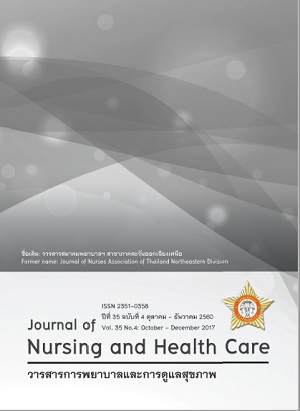สถานการณ์การบริโภคเกลือของผู้ป่วยความดันโลหิตสูงตำบลทางขวาง อำเภอแวงน้อย จังหวัดขอนแก่น Situation of Salt Intake among People with Hypertension in Thangkhuang Subdistrict, Waengnoi District, Khonkaen Province
คำสำคัญ:
การบริโภคเกลือ ผู้ป่วยความดันโลหิตสูง, Salt intake, people with hypertensionบทคัดย่อ
ผู้ป่วยโรคความดันโลหิตสูงที่ควบคุมระดับความดันโลหิตสูงไม่ได้ทำให้เกิดภาวะแทรกซ้อนที่ส่งผลให้เกิดความพิการและเสียชีวิต สาเหตุเกิดจากพฤติกรรมการดูแลตนเองไม่เหมาะสม โดยเฉพาะการบริโภคเกลือเกินตามวิถีชีวิตและความเชื่อของชุมชน การลดการบริโภคเกลือของผู้ป่วยความดันโลหิตสูงต้องอาศัยความร่วมมือจากชุมชนในการแก้ไขปัญหา การวิจัยนี้เป็นการวิจัยเชิงคุณภาพมีวัตถุประสงค์เพื่อศึกษาสถานการณ์การบริโภคเกลือในผู้ป่วยความดันโลหิตสูง โดยใช้กระบวนการประเมินชุมชนแบบมีส่วนร่วม เลือกพื้นที่และกลุ่มผู้ร่วมวิจัยแบบจำเพาะเจาะจง มีผู้ป่วยเข้าร่วมการวิจัยด้วยความสมัครใจ 80 คน ระยะเวลาดำเนินการวิจัยระหว่างเดือนตุลาคม ถึงเดือนธันวาคม พ.ศ. 2559 เก็บข้อมูลโดยการสัมภาษณ์การบริโภคเกลือ การสัมภาษณ์เชิงลึก การเสวนากลุ่ม การประชุมระดมสมองและสะท้อนคิด การสังเกตแบบมีส่วนร่วมและไม่มีส่วนร่วม วิเคราะห์ข้อมูลเชิงปริมาณโดยใช้การแจกแจงความถี่และร้อยละ วิเคราะห์ข้อมูลเชิงคุณภาพโดยการวิเคราะห์ข้อมูลเชิงเนื้อหา ผลการวิจัย ได้แก่ 1. พฤติกรรมการบริโภคเกลือและภาวะสุขภาพของผู้ป่วยความดันโลหิตสูง 3 กลุ่ม ได้แก่ 1.1 กลุ่มผู้ป่วยความดันโลหิตสูงที่ลดการบริโภคเกลือได้เหมาะสม 22 คน (ร้อยละ27.5) กลุ่มนี้มีผู้ที่ควบคุมระดับความดันโลหิตได้ และไม่มีภาวะแทรกซ้อน 20 คน (ร้อยละ25.0) ควบคุมความดันโลหิตไม่ได้และมีภาวะแทรกซ้อนทางไต 2 คน (ร้อยละ2.5) 1.2 ผู้ป่วยความดันโลหิตสูงที่พยายามลดการบริโภคเกลือแต่ยังบริโภคเกลือเกิน มี 35 คน (ร้อยละ43.7) กลุ่มนี้ควบคุมระดับความดันโลหิตได้ 3 คน(ร้อยละ3.7) ควบคุมความดันโลหิตไม่ได้ 32 คน (ร้อยละ40.0) ไม่มีภาวะแทรกซ้อน 9 คน (ร้อยละ11.2) มีภาวะแทรกซ้อน 26 คน (ร้อยละ32.5) เป็นภาวะแทรกซ้อนทางสมอง 3 คน (ร้อยละ3.7) ทางหัวใจ 3 คน (ร้อยละ3.7) และทางไต 20 คน (ร้อยละ25.0) 1.3 ผู้ป่วยความดันโลหิตสูงที่ยังไม่ลดการบริโภคเกลือและมีการบริโภคเกลือเกิน มี 23 คน (ร้อยละ28.7) กลุ่มนี้ควบคุมระดับความดันโลหิตได้ 3 คน (ร้อยละ3.7) ควบคุมความดันโลหิตไม่ได้ 20 คน (ร้อยละ25.0) ไม่มีภาวะแทรกซ้อน 4 คน (ร้อยละ5.0) มีภาวะแทรกซ้อน 19 คน (ร้อยละ23.7) เป็นภาวะแทรกซ้อนทางสมอง 4 คน (ร้อยละ5.0) ทางหัวใจ 3 คน (ร้อยละ3.7) และทางไต 12 คน (ร้อยละ15.0) 2. แรงจูงใจที่ทำให้ผู้ป่วยความดันโลหิตสูงลดการบริโภคเกลือ คือ ต้องการลดความเสี่ยงทางสุขภาพของตนเอง ลดความเสี่ยงทางสุขภาพของครอบครัว และเป็นแบบอย่างที่ดี 3. วิธีการลดการบริโภคเกลือตามประสบการณ์ของผู้ป่วยและชุมชน คือ การปรับเปลี่ยนรายการอาหาร การลดรับประทานอาหารที่ชอบที่มีรสเค็ม การลดปริมาณเครื่องปรุง การเลิกหรือหยุดรับประทานเครื่องปรุงบางชนิดที่มีเกลือมาก การหลีกเลี่ยงการรับประทานอาหารที่มีเกลือมาก 4. ปัจจัยสนับสนุนให้ผู้ป่วยความดันโลหิตสูงลดการบริโภคเกลือได้เหมาะสม คือ การสนับสนุนจากครอบครัว จากกลุ่มเพื่อนผู้ป่วยความดันโลหิตสูง และจากชุมชน 5. ปัจจัยเงื่อนไขที่ทำให้ผู้ป่วยความดันโลหิตสูงไม่สามารถลดการบริโภคเกลือได้เหมาะสม คือ วิถีชีวิตรับประทานอาหารร่วมวงกัน ความเชื่อว่ารับประทานเกลือทำให้แข็งแรง ฐานะยากจน ขาดการรับรู้เรื่องการบริโภคเกลือเกิน ขาดการสนับสนุนทางสังคมทั้งจากครอบครัวและจากชุมชน ค่านิยมติดรสชาติ และวิถีชีวิตเร่งรีบจำเป็นต้องซื้ออาหารปรุงเสร็จมารับประทาน
Un-controlled blood pressure among people with hypertension can cause complications resulting in many deaths and disabilities. The reason is due to inappropriate self-care behavior especially salty intake. This behavior, salty intake caused for the patient cannot reduce salt intake because of community’s way of life, behavior and beliefs. This requires cooperation from the community in solving problems together with hypertensive people. This study was a qualitative study using a Participatory Rural Appraisal, PRA process. The purpose was to study the salt intake among people with hypertension. Area study and participants were selected by purposive sampling. 80 people with hypertension enrolled as participants in a voluntary period during October to December 2016. Data were collected by interview, in-depth interview, group discussion, brainstorming and reflection, observation. Quantitative data were analyzed by using frequency and percentage. Qualitative data were analyzed by using content analysis.
The results showed that: 1. People with hypertension were classified by salt intake as three groups: 1) 22 People with hypertension (27.5 %) had appropriately reduced their salt intake, 20 patients (25.0 %) have proper health and can control blood pressure levels and without complications, two people (2.5%) had two complications as kidney complication; 2) 35 People with hypertension (43.7 %) tried to reduce salt intake but not appropriate, three patients (3.7 %) with controlled blood pressure, 32 patients (40.0 %) with uncontrolled blood pressure, 26 patients (32.5 %) were found with one complication (three people with brain (3.7 %), three people with heart (3.7 %), 20 people (25.0 %) with kidney complications); and 3) 23 patients with hypertension (28.7 %) had not reduced salt intake and excessive salt consumption and health, three patients (3.7 %) with controlled blood pressure and had no complications, 20 patients (25.0 %) with un-controlled blood pressure and 19 patients (23.7 %) had complication, (four people with brain, three people with heart and 12 people with kidneys complication). 2. The motivation for people with hypertension reducing salt intake as protection their own health risks, reduce their family health risks, and need to be the role model. 3. The way how to reduce salt consumption among the patient and the community experiences were modifying their daily menu as reducing salty menu, reducing component wear cessation or stop eating garnish with some salt, and avoid eating a lot of salt. 4. The factors that influenced to intake low salt diet among patients with hypertension as follows: proper family support; good support from group of people with hypertension; and community. 5. The factors that caused patients not to reduce salty consumption were the lack of awareness toward the salty consumption, lack of social support both from their family and community, lifestyle, eating together as a band, and strong belief that healthy live with salty intake.



